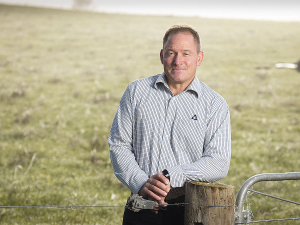LIC lifts half-year revenue on strong demand for dairy genetics
Herd improvement company LIC has posted a 5.2% lift in half-year revenue, thanks to increasing demand for genetics.
 The potential impact of having 48,000 extra cull cows could be a stretch for the meat processors, says LIC general manager NZ markets Malcolm Ellis.
The potential impact of having 48,000 extra cull cows could be a stretch for the meat processors, says LIC general manager NZ markets Malcolm Ellis.
One of the highest numbers of empty cows in recent years could play havoc with the meat industry and will likely cost the dairy industry more than $20 million dollars next season.
This is a probable outcome from the latest statistics from LIC, based on data from 4000 farms representing about 2.5 million cows.
LIC's general manager, NZ Markets, Malcolm Ellis, says the writing was on the wall last year when their data revealed that the national submission rate for dairy cows was down by 1.3%.
He says since he took on his present role with LIC seven years ago, the national variance rate has been about point three of a percent (0.3%) but this year's 1.3% is significant.
Ellis says in past years the highs and lows of regions have evened out the numbers and he says even this year the higher submission rates in the South Island stopped the numbers being even worse. He says the consequences of the low submission rate means that one percent fewer cows in the national herd will not calve in the first six weeks of the spring.
"I calculate that this will result in 2.7 million kgMS not being produced and effectively lost," he says.
The consequence of the cows not getting pregnant, says Ellis, is that the empty rate for this coming season is likely to be around 17.2%. He says last year the final empty rate was 16.2% and over the years has hovered between 15% and 16%. Ellisa says it's unlikely the interim numbers for this year will change much, although there is a possibility there will be some very late calvers.
While there is likely to be a significant loss of milk production, the potential impact of having 48,000 extra cull cows as a result of the 1% empty rate is going to be a stretch for the meat processing companies.
Ellis says some farmers may retain a few of their dry cows, but regardless there will still be more cull animals to process than normal. The meat industry is still short of staff and there are ongoing problems with sickness.
"Then there is the issue of seasonal supply and demand on the meat schedule," he says.
Ellis says that combined with the nervousness of a lower milk price the empty rate will add to the woes of farmers. In light of this, he predicts that many farmers will "milk deep" this season given that grass covers are good and the weather favourable.
As for the reasons for the higher-than-normal empty rate, Ellis says the weather last year was certainly a contributing factor.
"Also, I think there was a lot of farmer fatigue going into the winter and spring. You don't have to be much off your game to make slightly poorer farm management decisions. We do know there was a genuine skill shortage on farm, and we often had quite junior people making strategic decisions at key times of the year," he says.
Malcolm Ellis says the interim figures represent the typical bell-shaped curve which means there are farmers with tremendous reproduction btu there are also some that are well below the average.
Budou are being picked now in Bridge Pā, the most intense and exciting time of the year for the Greencollar team – and the harvest of the finest eating grapes is weeks earlier than expected.
The Real Estate Institute of New Zealand (REINZ) has released its latest rural property report, providing a detailed view of New Zealand’s rural real estate market for the 12 months ending December 2025.
Rural retailer Farmlands has released it's latest round of half-year results, labeling it as evidence that its five-year strategy is delivering on financial performance and better value for members.
OPINION: "We are back to where we were a year ago," according to a leading banking analyst in the UK, referring to US president Donald Trump's latest imposition of a global 10% tariff on all exports into the US.
DairyNZ says the Government’s proposed Resource Management Act reform needs further work to ensure it delivers on its intent.
Overseas Trade Minister Todd McClay says he's working constructively with the Labour Party in the hope they will endorse the free trade agreement (FTA) with India when the agreement comes before Parliament for ratification.

OPINION: A mate of yours truly reckons rural Manawatu families are the latest to suffer under what he calls the…
OPINION: If old Winston Peters thinks building trade relations with new nations, such as India, isn't a necessary investment in…